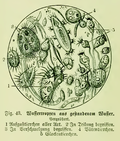Infusoria
Infusoria is a collective term for minute aquatic creatures such as ciliates, euglenoids, protozoa, unicellular algae and small invertebrates that exist in freshwater ponds. The term is often used in the context of microbiology and zoology.
Overview[edit]
Infusoria are organisms that are typically found in infusions of decaying organic material. They are used as food for aquarium fish and invertebrates during their early stages of development. Infusoria are also used in research, particularly in the field of genetics.
Characteristics[edit]
Infusoria are characterized by their small size, usually less than 0.5 mm in length. They are typically unicellular, although some species are multicellular. Infusoria are heterotrophic, meaning they obtain their energy from organic substances. They reproduce both sexually and asexually.
Classification[edit]
Infusoria are classified under the kingdom Protista, which includes a diverse group of eukaryotic microorganisms. Within the kingdom Protista, infusoria are further classified into various phyla and classes, including the phylum Ciliophora, which includes the ciliates, and the phylum Euglenozoa, which includes the euglenoids.
Habitat[edit]
Infusoria are found in a variety of aquatic environments, including freshwater ponds, streams, and lakes. They are also found in soil and in the gut of various animals.
Role in Ecosystem[edit]
Infusoria play a crucial role in the ecosystem. They are a key component of the microbial loop, which is the process by which nutrients are recycled in aquatic ecosystems. Infusoria also serve as a food source for larger organisms, including fish and invertebrates.
See Also[edit]
References[edit]
<references />
Ad. Transform your life with W8MD's Budget GLP-1 injections from $75


W8MD offers a medical weight loss program to lose weight in Philadelphia. Our physician-supervised medical weight loss provides:
- Weight loss injections in NYC (generic and brand names):
- Zepbound / Mounjaro, Wegovy / Ozempic, Saxenda
- Most insurances accepted or discounted self-pay rates. We will obtain insurance prior authorizations if needed.
- Generic GLP1 weight loss injections from $75 for the starting dose.
- Also offer prescription weight loss medications including Phentermine, Qsymia, Diethylpropion, Contrave etc.
NYC weight loss doctor appointmentsNYC weight loss doctor appointments
Start your NYC weight loss journey today at our NYC medical weight loss and Philadelphia medical weight loss clinics.
- Call 718-946-5500 to lose weight in NYC or for medical weight loss in Philadelphia 215-676-2334.
- Tags:NYC medical weight loss, Philadelphia lose weight Zepbound NYC, Budget GLP1 weight loss injections, Wegovy Philadelphia, Wegovy NYC, Philadelphia medical weight loss, Brookly weight loss and Wegovy NYC
|
WikiMD's Wellness Encyclopedia |
| Let Food Be Thy Medicine Medicine Thy Food - Hippocrates |
Medical Disclaimer: WikiMD is not a substitute for professional medical advice. The information on WikiMD is provided as an information resource only, may be incorrect, outdated or misleading, and is not to be used or relied on for any diagnostic or treatment purposes. Please consult your health care provider before making any healthcare decisions or for guidance about a specific medical condition. WikiMD expressly disclaims responsibility, and shall have no liability, for any damages, loss, injury, or liability whatsoever suffered as a result of your reliance on the information contained in this site. By visiting this site you agree to the foregoing terms and conditions, which may from time to time be changed or supplemented by WikiMD. If you do not agree to the foregoing terms and conditions, you should not enter or use this site. See full disclaimer.
Credits:Most images are courtesy of Wikimedia commons, and templates, categories Wikipedia, licensed under CC BY SA or similar.
Translate this page: - East Asian
中文,
日本,
한국어,
South Asian
हिन्दी,
தமிழ்,
తెలుగు,
Urdu,
ಕನ್ನಡ,
Southeast Asian
Indonesian,
Vietnamese,
Thai,
မြန်မာဘာသာ,
বাংলা
European
español,
Deutsch,
français,
Greek,
português do Brasil,
polski,
română,
русский,
Nederlands,
norsk,
svenska,
suomi,
Italian
Middle Eastern & African
عربى,
Turkish,
Persian,
Hebrew,
Afrikaans,
isiZulu,
Kiswahili,
Other
Bulgarian,
Hungarian,
Czech,
Swedish,
മലയാളം,
मराठी,
ਪੰਜਾਬੀ,
ગુજરાતી,
Portuguese,
Ukrainian




